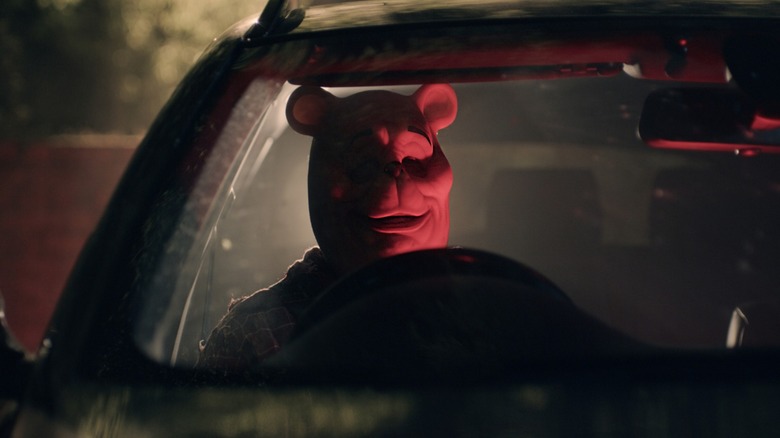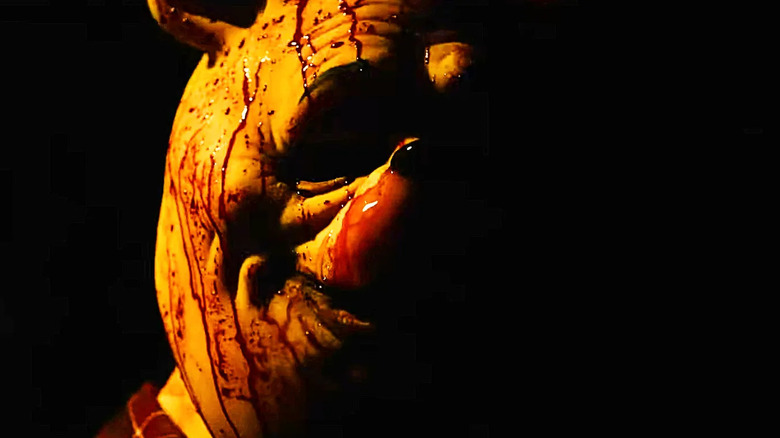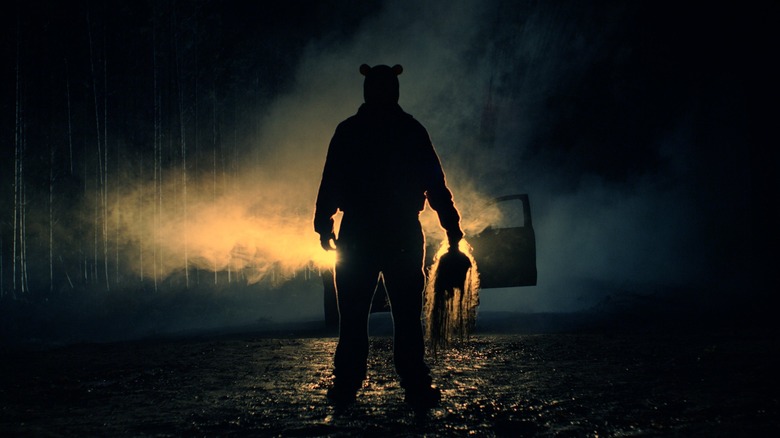Winnie-The-Pooh: Blood And Honey Director Has More Movies Planned To Ruin Your Childhood
Rhys Frake-Waterfield's new horror film "Winnie-the-Pooh: Blood and Honey" takes the toddler-like characters from A.A. Milne's beloved 1926 children's novel, and transforms them into lumbering, human-hating, bloodthirsty serial killers. If you ever wanted to see Christopher Robin's little yellow Pooh bear as Leatherface from "The Texas Chain Saw Massacre," then "Blood and Honey" is for you.
The central gag of Frake-Waterfield's film is, of course, the juxtaposition of Milne's childlike innocence with the violent crassness of your average slasher movie. One might ostensibly get a certain lascivious thrill from seeing well-known childhood imagery blended with adult material. A similar approach was used in Danishka Esterhazy's 2019 film "The Banana Splits Movie" which saw the stars of the 1968 children's TV show turned into murderous robots, as well as any number of horror fairy tales (1997's "Snow White: A Tale of Terror," 1996's "Pinocchio's Revenge," and many, many others come to mind).
Because most of the above stories are now in the public domain ("The Banana Splits" notwithstanding), any horror filmmaker with a modicum of gumption — and an admirable amount of bad taste — can happily adapt any beloved children's classic into a blood-soaked, nudity laden, drive-in horror flick. Why let Disney lay claim to every European folk tale when they belong to everyone?
Frake-Waterfield sees no reason to stop the wholesale taint of the world's youth, and admitted, in a recent interview with the Hollywood Reporter, that he very much intends to make gory, terrifying versions of other public domain kids' stories, building out an entire cinematic universe where humans could easily be mauled by Bambi.
The Desolation of Bambi
Back in November of 2022, long before the actual release of his "Blood and Honey," Frake-Waterfield had already announced plans to adapt J.M. Barrie's "Peter and Wendy" into a bleak horror movie called "Peter Pan's Neverland Nightmare." He recently expanded on that idea, saying that his version of the fairy Tinkerbell would be an obese drug addict. More recently, the director also announced a plan for "Bambi: The Reckoning," based on Felix Salten's 1923 novel "Bambi, a Life in the Woods," which would transform a gentle fawn into an unstoppable killing machine. Naturally, when ambitions are running high, crossovers enter the conversation, and Frake-Waterfield mentioned that he may also already be considering a mash-up, saying:
"The idea is that we're going to try and imagine they're all in the same world, so we can have crossovers. [...] People have been messaging saying they really want to see Bambi versus Pooh."
While "Winnie-the-Pooh: Blood and Honey" is not a good movie, Frake-Waterfield seems to have made it as part of a larger, more metatextual media criticism project. Milne's "Winnie-the-Pooh" only entered into the public domain in January of 2022, after spending decades in the hands of the Disney corporation. Disney also made a celebrated version of "Peter Pan" in 1953, and of "Bambi" in 1942. Disney, through decades of insidious marketing, have unofficially branded multiple public domain fairy tales as "theirs." Cinderella may belong to the people, but Disney's 1950 version is what audiences might first picture.
Frake-Waterfield wants to point out that any version of these stories is possible, including the sickest, dumbest slashers you could imagine. "Blood and Honey" is just as valid in a media landscape as Disney's 1977 film "The Many Adventures of Winnie the Pooh."
More than Disney
Disney is worth attacking because the company has been notoriously litigious about protecting its brand. One can't splatter blood on Winnie-the-Pooh quickly enough.
While Frake-Waterfield's horror ambitions may start with a skewering of Disney — call them "shlockbusters" — he also said that he wants to do much more. Disney hasn't laid claim to every single folktale and century-old children's novel, and the "Pooh" filmmakers are keen on expanding into some of those areas as well. Frake-Waterfield still wants to associate childhood sweetness with horror, but not all in the Disney mold. He said:
"There are many, many, many other ideas out there which aren't tied to Disney, loads of old fairytales and urban legends, concepts that are synonymous with your childhood, and they're the ones which I want to build up into a twisted alternative reality."
He does not expand on what other legends he refers to, but the imagination immediately begins reeling. Prepare, perhaps, for a horrible Shoemaker and the Elves, or a murderous Pecos Bill. Perhaps a kaiju film about Paul Bunyan and Babe the Blue Ox. Regardless, some creative screenwriting may be necessary, as there are already horror/violent versions of the Tooth Fairy, Pinocchio, Snow White, the Gingerbread Man, Goldilocks and the Three Bears, Humpty Dumpty, Hansel & Gretel, the Little Mermaid, Rapunzel, Sleeping Beauty, and countless others. Highly recommend is Matthew Bright's 1996 film "Freeway," a sleazy crime-soaked Little Red Riding Hood tale with Reese Witherspoon as Red and Kiefer Sutherland as the Big Bad Wolf.
Frake-Waterfield, it seems, has his work cut out for him.


